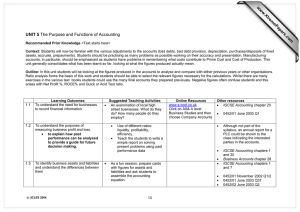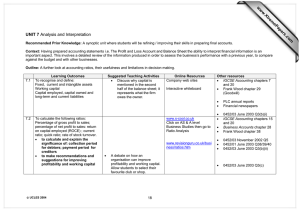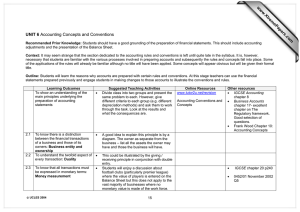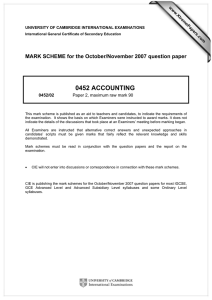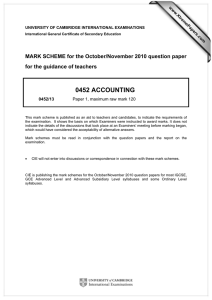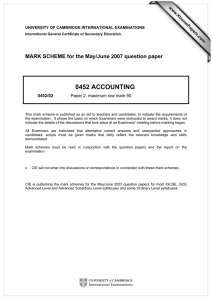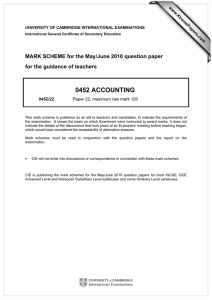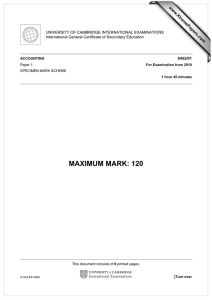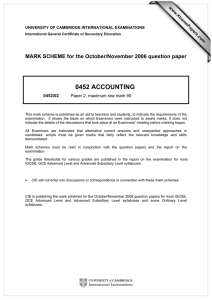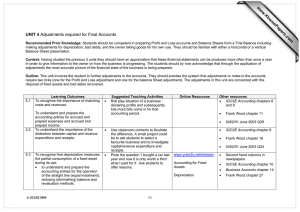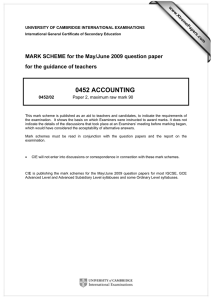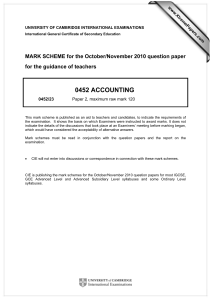UNIT 2
advertisement
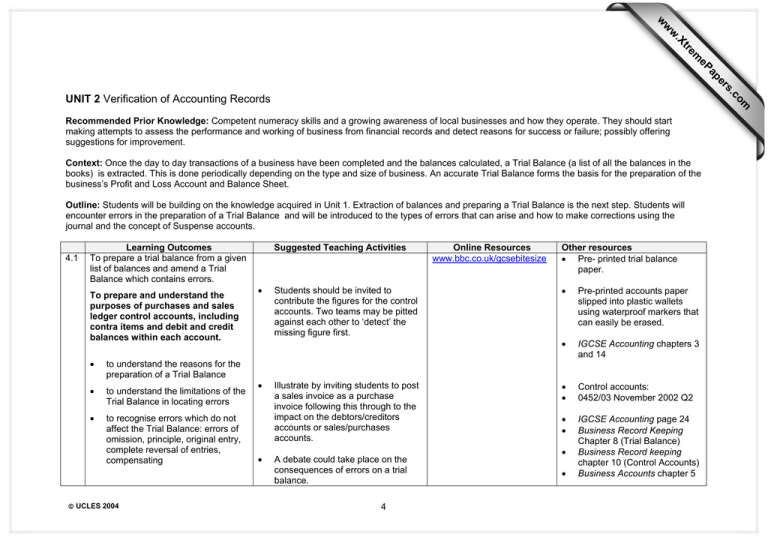
om .c s er ap eP m e tr .X w w w UNIT 2 Verification of Accounting Records Recommended Prior Knowledge: Competent numeracy skills and a growing awareness of local businesses and how they operate. They should start making attempts to assess the performance and working of business from financial records and detect reasons for success or failure; possibly offering suggestions for improvement. Context: Once the day to day transactions of a business have been completed and the balances calculated, a Trial Balance (a list of all the balances in the books) is extracted. This is done periodically depending on the type and size of business. An accurate Trial Balance forms the basis for the preparation of the business’s Profit and Loss Account and Balance Sheet. Outline: Students will be building on the knowledge acquired in Unit 1. Extraction of balances and preparing a Trial Balance is the next step. Students will encounter errors in the preparation of a Trial Balance and will be introduced to the types of errors that can arise and how to make corrections using the journal and the concept of Suspense accounts. 4.1 Learning Outcomes To prepare a trial balance from a given list of balances and amend a Trial Balance which contains errors. To prepare and understand the purposes of purchases and sales ledger control accounts, including contra items and debit and credit balances within each account. • to understand the reasons for the preparation of a Trial Balance • to understand the limitations of the Trial Balance in locating errors • to recognise errors which do not affect the Trial Balance: errors of omission, principle, original entry, complete reversal of entries, compensating © UCLES 2004 Suggested Teaching Activities • • • Students should be invited to contribute the figures for the control accounts. Two teams may be pitted against each other to ‘detect’ the missing figure first. Illustrate by inviting students to post a sales invoice as a purchase invoice following this through to the impact on the debtors/creditors accounts or sales/purchases accounts. A debate could take place on the consequences of errors on a trial balance. 4 Online Resources www.bbc.co.uk/gcsebitesize Other resources • Pre- printed trial balance paper. • Pre-printed accounts paper slipped into plastic wallets using waterproof markers that can easily be erased. • IGCSE Accounting chapters 3 and 14 • • Control accounts: 0452/03 November 2002 Q2 • • IGCSE Accounting page 24 Business Record Keeping Chapter 8 (Trial Balance) Business Record keeping chapter 10 (Control Accounts) Business Accounts chapter 5 • • 4.2 To correct errors by journal entries • To correct errors using journal entries In the preparation of journal entries impress on students the use of a narrative. To draw up a suspense account A good supply of opening journal information of a sole trader will beneficial in the initial stages. To adjust the profit or loss for an accounting period taking into account the effect of correcting errors made • Frank Wood chapter 7 • • • 0452/01 June 2003 Q17/18 0452/01 November 2002 Q16 Pre-printed journal paper. • IGCSE Accounting chapter 13 • Business Record Keeping chapters 11/17 • Business Accounts chapter 10 • Frank Wood chapters 17/32 • Two white boards - One for the cash book and one for the bank statement To demonstrate the effects of the correction of errors on Assets and Liabilities of a Business • 4.3 adjust the profit or loss for an accounting period after the correction of errors • demonstrate the effects of correction of errors on a Balance Sheet To understand the need for a bank reconciliation statement Student involvement in writing up the cash book and the bank statement. To update the cash book • To write up a bank reconciliation • • • • © UCLES 2004 Students asked to bring bank statements Students given examples of how bank statements may not agree with cash book (bank columns) e.g bank charges Students to update cash books Students to draw up a bank reconciliation statement. Discussion on reasons why the cash book (bank columns) and 5 • IGCSE Accounting chapter 12 • • 0452/01 June 2003 Q22 0452/03 June 2003 Q3(a) Movie – ‘Catch me if you can’ The movie shows how clearing delays could occur. the bank statements could differ. © UCLES 2004 6
